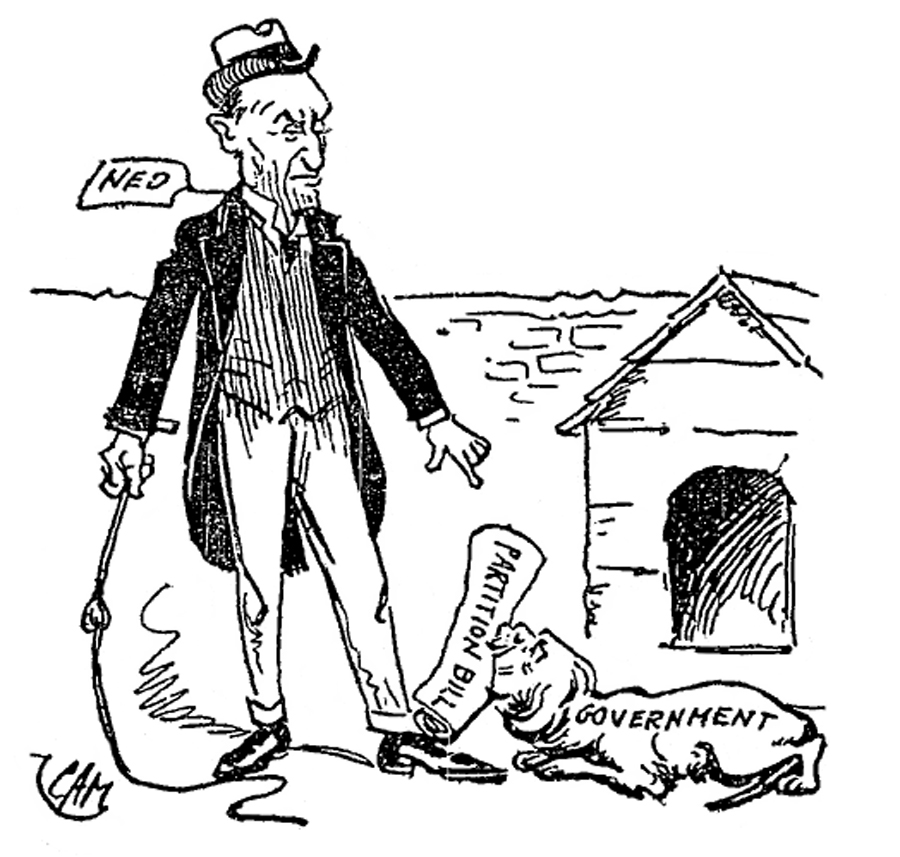Unionism divided over British plans to partition Ireland
Belfast, 15 March 1920 - The government’s plan to partition Ireland has divided Irish unionists along geographic lines – north and south.
After a week spent deliberating the government’s plans, the
Ulster Unionist Council (UUC) decided, yesterday, to support a
resolution which effectively endorses the establishment of a
northern parliament for a six-county area.
This endorsement followed the rejection of a proposal put forward
on behalf of unionists in Cavan, Monaghan and Donegal that called
upon the party to insist upon the alteration of the
government’s bill to encompass all nine counties of Ulster.
Sir Edward Carson, addressing a gathering at the West Belfast Orange Hall on the Shankill Road yesterday evening, said that in the ‘momentous decisions that we had to take we had one consideration before us, and one consideration only, and that was to do what was best for Ulster.’
The Belfast Newletter has defended the UUC’s decision arguing that the inclusion of the three other counties of Ulster would bring with it an anti-unionist representation strong enough to endanger the existence of the northern parliament and drag the entire province into the area of the Dublin parliament.

Sir Edward Carson (right) arriving at the meeting of the Ulster Unionist Council alongside Ronald McNeill (Image: Irish Life, 19 March 1920)
Meanwhile, the Unionist Anti-Partition League (UAPL) has addressed a letter to the British Prime Minister taking him to task for the partition plan that lies at the core of his home rule bill. The signatories of the letter include all those who represented southern unionism at the Irish Convention and challenges the proposed settlement on the grounds that it threatens disaster not only to Irish unionists, but also to Irish nationalists, the United Kingdom and the Empire.
The basis of the UAPL's criticism is that the the government's proposals fail to pass a test for success that was laid out by Lloyd George himself in February 1918 when he told the chairman of the Convention that the ‘only hope of agreement’ lay in a solution guaranteeing three things: a single legislature for a united Ireland; adequate safeguards for minorities; and the fundamental unity of the three kingdoms.
None of these, it is argued, will be met by the government’s proposals which permanently divide the country and, as the Irish Times is reporting, ‘abandons three-quarters of Ireland, including 400,000 southern loyalists, to the bitterest enemies of the British Crown.’
Catholics in partitioned Ulster
It is not only unionists that are threatened by partition. Irish
nationalism faces similar worries, with Ulster catholics
expressing concern at plans that would see them reduced to a
minority status under a northern parliament.
Patrick O’Donnell, the Bishop of Raphoe pointed out that during the long deliberations of the Irish Convention ‘partition was never once put forward to solve anything. Even the device of provincial assemblies under a national parliament had no adherents to push it.’
According to Dr O’Donnell, Ireland is being governed today by a ruling class in England in the same spirit that dictated the plantation of Ulster in the 17th century. The bishop concluded that the ‘policy of the British government is every day strengthening the hands of the extremists, and making the chances of an acceptable settlement more and more remote.’
[Editor's note: This is an article from Century Ireland, a fortnightly online newspaper, written from the perspective of a journalist 100 years ago, based on news reports of the time.]





















